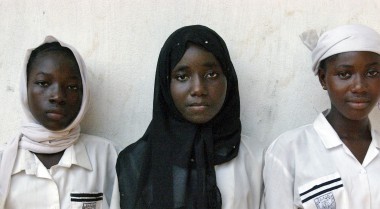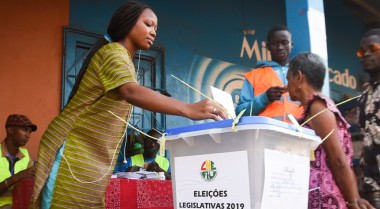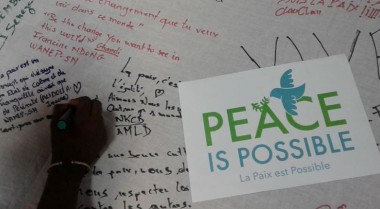
Elections and the Future Agenda of Liberia: A needed focus on youth engagement and participation
Following 133 years of settlers one party rule (1847-1980), ten years of military- semi democratic and countless transitional, factional as well as interim arrangements occasioned by various civil wars in Liberia (1989 and 2003)- that led to the total breakdown of the political governance process described largely by various commentators as "strongmen politics" "the coming anarchy", "patrimonial state," "warlord politics," "failed state," "rogue state,"- Africa's oldest republic has adopted pluralistic democracy since 2006 thus putting an end to ad hoc governance processes. To prevent a relapse to conflict, various interim arrangements were established to incorporate and accommodate different factions, opposition parties and leaders into the political theater. The winner takes it all structure of Liberia's political electoral system renders the process ‘a do or die' endeavor. Aspirants' campaign not based on ideological principles but exploit the ignorance of the vulnerable populace. A country with a high illiterate population, politicians conveniently prey on the gullibility of the people and push for political marriages of convenience, like interim government, to satisfy their personal aggrandizement. Like in most post crisis settings, such political accommodation is a way of mitigating and limiting real and potential violence. But, Partners of the Civil Society Platform for Peacebuilding and Statebuilding (CSPPS) in Liberia, maintained that the paradigm is shifting despite the dynamics around the on-going the October 2017 presidential and legislative elections.
Democratic elections rather than factional government
Elections after wars pose unique challenges. With the cessation of Liberia civil war in 2003, the international community supported Liberia's quest for electoral democracy by disarming, demobilizing, reintegrating both displaced populations and warring factions, setting up an interim administration and most importantly setting up electoral system. All these interventions led to the election of Africa's first female president, President Ellen Johnson Sirleaf in 2006 and two subsequent democratic elections, which bolstered Liberia's democratic credential. Compared to the way leaders were chosen since Liberia gained independence in 1847, the 2006, 2011 and October 2017 elections, members of the CSPPS Liberia Country Team believe this is not only an adherence to democratic practices but signs of free political participation and competition. However, having these processes in place are not the only sin qua non for democratic governance because the failure to appoint credible people to manage electoral process can also undermine the legitimacy of the process and create reasons for violence and chaos.
While the importance of elections in building and consolidating political governance is inevitable in pluralistic democracy, it is equally important to note that good elections are directly linked to the independence of the election Commission, the judicial system, a competitive media environment, the ability of civil society to be involved in public life and a political landscape that allows free expression of diverging views.
The CSPPS Liberia Country Team called on the 20 presidential aspirants and 986 representative candidates in Liberia to utilize every opportunity publicly and privately to convince more than 2 million voters why they should be elected. The common theme for most opposition candidates focused on the weaknesses of the ruling government, which include the failure to curb corruption, bad road network, inadequate drugs at the hospitals, messy educational system, dual currency market, high taxation and poor economy policy, lack of policy that prioritizes and gives Liberians economic opportunities, nepotism, cronyism, high youth unemployment, low representation of women in politics, high cost of living, etc.
While the importance of elections in building and consolidating political governance is inevitable in pluralistic democracy, it is equally important to note that good elections are directly linked to the independence of the election Commission, the judicial system, a competitive media environment, the ability of civil society to be involved in public life and a political landscape that allows free expression of diverging views. Contrary to popular opinion that it is difficult to unseat ruling establishment in Africa because elections are intended to entrench the ruling institution, in the Liberian context, the political discourse according to analyst is about "right hands" and "wrong hands". The October 10, 2017 elections in Liberia signal a new dawn as we are seeing from all indication that democracy is now taking a new trend. The turnout was huge, 75.2% of 1.6M Liberians voted. There were long queues. George Weah's CDC received 38.4% of the total votes; Joseph Boakai, 28.8%; and Charles Brumskine, LP 9.6%. They received the highest votes. With these results, the National Elections Commission (NEC), certified CDC and UP for the runoff election originally scheduled for November 7. Indeed, after more than a decade of Unity Party rule, the tie seems to be swinging with a former footballer and current lawmaker, George Weah trying to boot out the incumbent.
However, as the National Elections Commission announced the results, the leader of the opposition Liberty Party, Cllr, Charles Brumskine, filed a writ of prohibition to the Supreme Court to halt the runoff election. The Court ruled for the party and ordered NEC to speedily investigate the complaints. That ruling, accordingly, was based on due process and not on the weight of the alleged electoral irregularities and frauds. Interestingly, while LP won its appeal at the court, it later demanded the recusal or removal of NEC commissioners on the case. It argued that the commissioners cannot judge a case which they have already denied. More interestingly, the Ruling UP Party also filed complaint against the NEC for election irregularities. An unprecedented political alliance has since been formed among the Ruling party and opposition political parties. Meanwhile until now, there is no new date set for the roundoff elections making political observers to predict potential constitutional crisis, after January 2018, which is the period for the incumbent president to hand over power. This clearly suggests that elections are not merely window-dressing exercises aimed at legitimizing the status quo of the incumbent but way of exercising democratic franchise. Furthermore, democracy also entails an understanding of its complex dynamics such as the need to evaluate and analyze the past, the present, and the protracted future. The Truth and Reconciliation Commission (TRC) produced a comprehensive report highlighting critical issues that need to be considered to heal the wound Liberia suffers. Although the current leadership tackled some of the TRC's recommendations, Madam Sirleaf admitted recently in her State of the Nation address that her government had failed to reconcile Liberians and corruption has proven difficult to fight because it is a "vampire". What does this mean for young electorates that make up close to 70% of Liberia's 4.5 million population?
It must eagerly be noted that while the issue of youth unemployment is crucial in terms of who they vote for, this subject remains a threat to Liberia's fragile peace and democracy because no degree of focus on employment and empowerment can by themselves result into any positive dividends, if these interventions are not tied in with and focus on Education and Training.
Youth and Unemployment
As in most fragile states, traditional concepts of ‘employment' as a singular state do not apply in Liberia. Instead, because of 14 years of brutal civil war, which deprived most young people of the chance of pursuing their dreams and ambitions, young people navigate complex livelihoods, earning income from multiple sources. The implications of the dilemma young people find themselves in are expressed through their voting preferences and choices. As most analysts note, youth unemployment is among the major causes of social and political disorder. While the issues of employment, unemployment, and/or underemployment underlined the uprisings in Tunisia, Egypt, and most of what has come to be known as the ‘Arab Spring', resulting in Youth Uprisings and the toppling of Governments, it is said that "no society can survive for long if close to 20% or more of its youth, with lots of energy are unemployed. Similarly, it has also been stated that "no society can endure 25% youth unemployment rate for long, without inflicting serious long-term damage." Depending on who one speaks to, youth unemployment in Liberia ranges from 85% to 3.7%. Whether the 20,000 jobs promised by the current administration have been created is not preoccupation of the CSPPS Country Team but the nexus between vague promises and youth votes is a lesson for all aspirant leaders. It must eagerly be noted that while the issue of youth unemployment is crucial in terms of who they vote for, this subject remains a threat to Liberia's fragile peace and democracy because no degree of focus on employment and empowerment can by themselves result into any positive dividends, if these interventions are not tied in with and focus on Education and Training. With the nation's educational system being a "mess", it is no wonder that youth are looking for alternative even if their perceived choice is not capable of meeting their expectation.
The adoption of United Nations Security Council Resolution (UNSCR) 2250 on Youth, Peace and Security in December 2015 marked a significant milestone in the recognition of the role which young women and young men can play in preventing violent conflict and in building and sustaining peace. Although the age difference between the two candidates could serve as pull factor, particularly in favor of George Weah, however most of Liberian youth are soccer fanatic hence gravitate to Mr. Weah who is a former, Africa best, European best and World best. The key question is despite all the accolades and iconic status, based on the approach of the New Deal for Engagement in Fragile States and the UNSCR 2250, does Senator Weah or V.P Joseph Boakai have any strategy to strengthen and consolidate the involvement and participation of young people in statebuilding and peacebuilding activities? The CSPPS Country Team in Liberia wants this issue to be a key part of the political discussion in Liberia.
It is important to note that youth in Liberia are not a homogeneous block. The fact that youth constitutes a diverse segment of the population, some in their mid-thirties and forties may still be in school and without jobs and therefore there is a need for any government that wins the pending election to critically look at the needs of this group in a much holistic way by bringing civil society, including young women and men and youth-led organizations, into the decision making processes as well as creating opportunities for regular interaction with state and non-state actors. CSPPS Country Team in Liberia also wants the Liberian Government and international partners to provide resources to national stakeholders to undertake comprehensive research to understand which segment of the population is more prone to violence and formulating appropriate strategies to mitigate violence. This will be in conformity with some of principles of the New Deal, which call for "working in a political way to address the root causes of conflict and fragility and to channeling investments in fragile states in line with basic but adapted aid effectiveness principles".
While Liberia has made considerable gains since the civil war ended, the youth agenda is still confronted with deep challenges. It goes without saying that the youth need to be largely educated, healthy and productively employed and appropriate policies are put in place to support a sustained productivity employment and investment potentials associated with the condition. Moreover, those youth, who are sometime called the "New youth" because of the complexity of their challenges such as the lack of basic education, skills, drugs addicts, former child soldiers, Zogos, etc., will need more interventions and supports to improve their status or overcome certain hurdles. This is not to mention the common variances both in aspirations and needs according to gender, age, and disability, among other variables.
In other words, deficiencies in our youth agenda implies that whosoever wins will have to assert concrete effort and engage real time experts to tackle the youth issue because over a third of the 169 Sustainable Development Goals (SDGs) targets highlight the role of young people and the importance of their empowerment, participation, and well-being.
This blog post was submitted and authored by Jimmy Suah Shilue, CSPPS Country Team Member in Liberia.



